AI in sales: A guide to the best AI sales tools and best practices for 2025
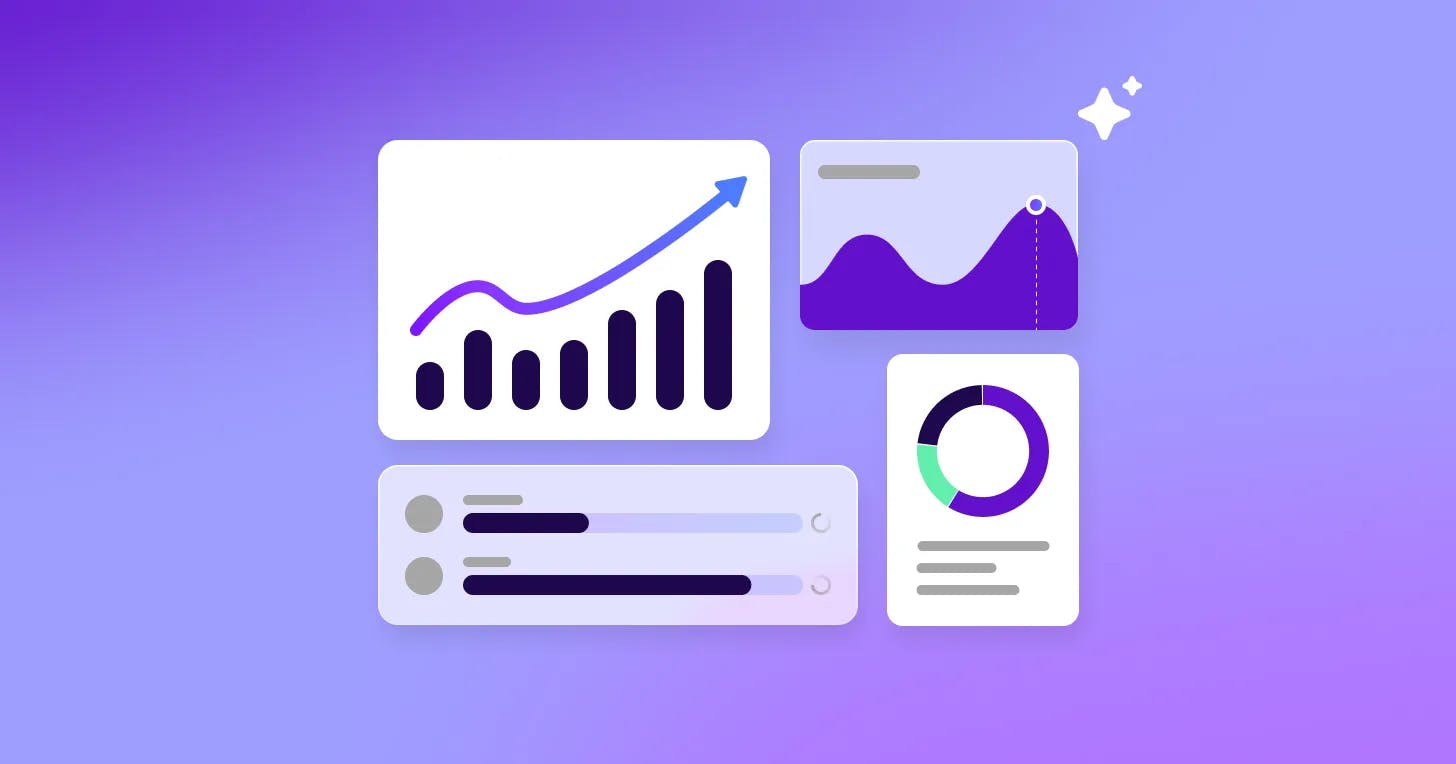
According to the latest estimates, most sales reps don’t start selling until over half the day is gone. Instead, they're buried in tedious tasks like research, updating CRMs, writing emails—and losing time that could be spent building relationships and closing deals.
Fortunately, AI in sales can handle a huge chunk of this busywork in a fraction of the time. According to McKinsey, 1 in 5 sales tasks is ripe for automation with AI. Gartner predicts that by 2027, 95% of seller research will start with AI.
AI isn’t just streamlining sales—it’s making it truly data-centric. By analyzing big data and applying business intelligence at scale, AI promises gains in operational efficiency, customer experience (CX), and sales performance.
Whether you're a sales leader aiming to boost performance or a sales rep looking to close more deals with the latest tools, this guide will help you understand how you can use AI to sell better, faster, and hit your goals with less guesswork.
Specifically, we’ll cover:
What is AI in sales?
AI in sales refers to the use of artificial intelligence technologies such as machine learning, natural language processing (NLP), agentic AI, and predictive analytics to automate, optimize, and enhance the sales process.
By analyzing CRM activity, call transcripts, and even unstructured datasets, AI can uncover patterns, insights, and opportunities in data that would otherwise go unnoticed. Using these insights, AI can automate the most data-heavy and repetitive tasks of sales teams, freeing reps to focus on high-value activities that improve sales performance.
AI is more than smarter sales automation, though. It empowers teams to more accurately predict buyer behavior and sales outcomes, sell with real-time insights at their fingertips, scale personalization across channels, and more. By enabling teams to use big data effectively across the sales funnel, AI acts as a force multiplier—helping teams to sell smarter, faster, and better.
AI in sales can perform in various key roles:
Analyst: AI algorithms excel at data analysis that’s too complex for humans. By spotting patterns in data, AI offers a deeper understanding of customer behavior, trends, and more.
Forecaster: AI can predict pipeline health, deal velocity, and revenue outcomes with greater accuracy than traditional methods.
Automator: Handles various repetitive tasks, freeing up sales reps to focus on high-value activities.
Copilot: Assist reps in real-time during customer interactions—surfacing insights, offering feedback, and training to optimize performance.
Personalizer: AI can tailor every interaction based on historical data and current behavior to create a more seamless, tailored buyer experience at scale.
Pro tip: While AI shines at crunching data, surfacing insights, and automating top-funnel tasks, the nuances of bottom-funnel activities—like persuasion, handling objections, and customizing solutions—still require a human touch.

8 major support hassles solved with AI agents
8 AI in sales use cases
AI is reshaping traditional processes across sales and creating new opportunities for growth. According to Hubspot, it’s already being used by 87% of sales professionals. Here’s how:
Sales prospecting
AI streamlines the process of identifying and scoring potential leads. By analyzing vast datasets, AI algorithms can quickly find patterns and characteristics of ideal customers to make prospecting more accurate and efficient. In fact, 73% of sales professionals agree that AI can help them pull insights from data they otherwise wouldn't be able to find.
Going further, AI tools can automate much of the work of SDRs by auto-researching contacts in your CRM, enriching lead profiles from top sources, and then executing personalized outreach strategies. This helps teams to save time and build a more qualified sales pipeline.
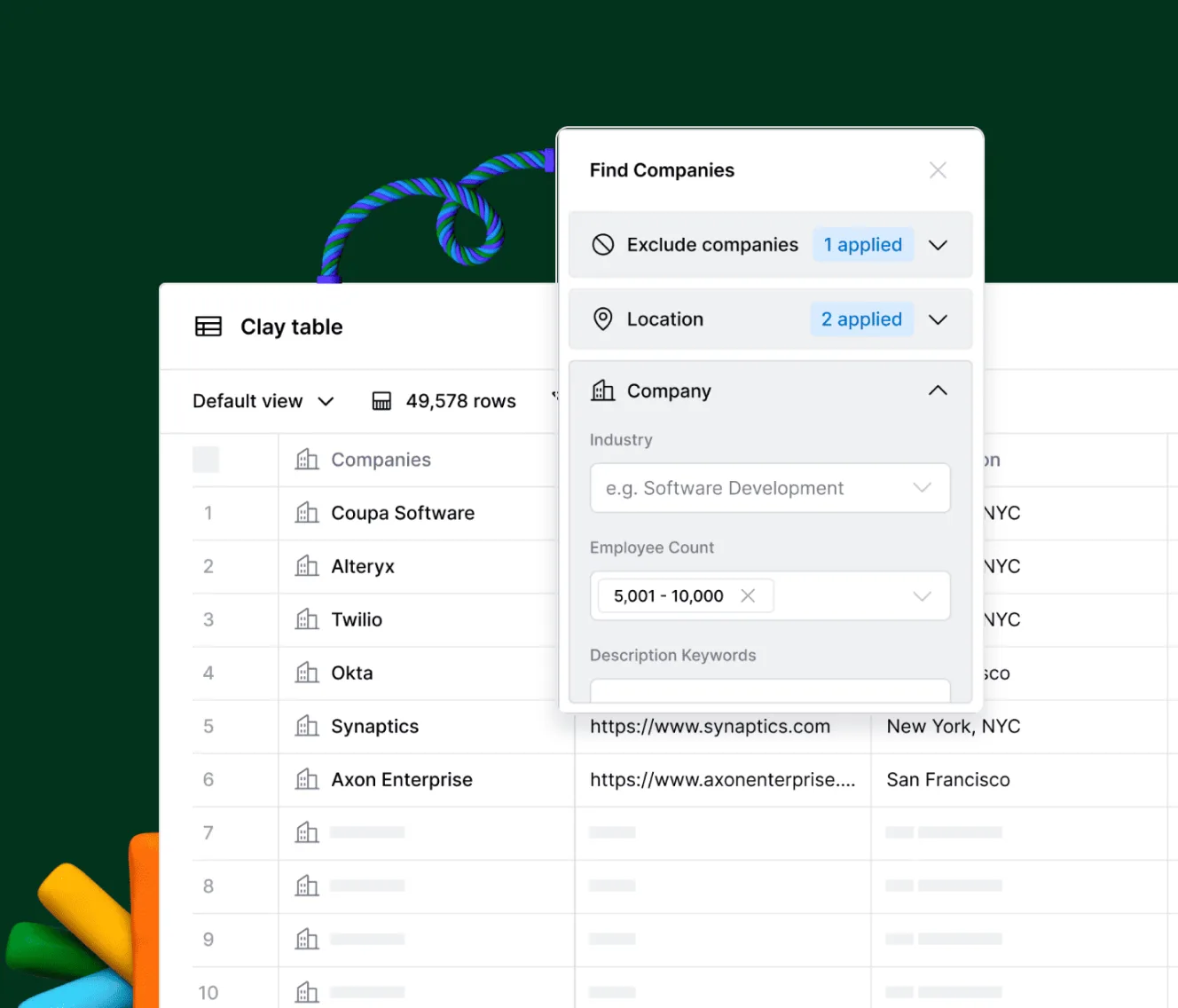
Sales forecasting
AI can predict future trends and sales performance with greater accuracy and reliability than traditional methods. By analyzing holistic sets of data like customer profiles, market trends, and economic conditions with machine learning, AI tools can reduce forecasting errors by 20-50% and help reduce lost sales by up to 65%. With this deeper insight, sales leaders can make smarter calls on hiring, budgeting, and when to capitalize on opportunities, making business intelligence a competitive edge.
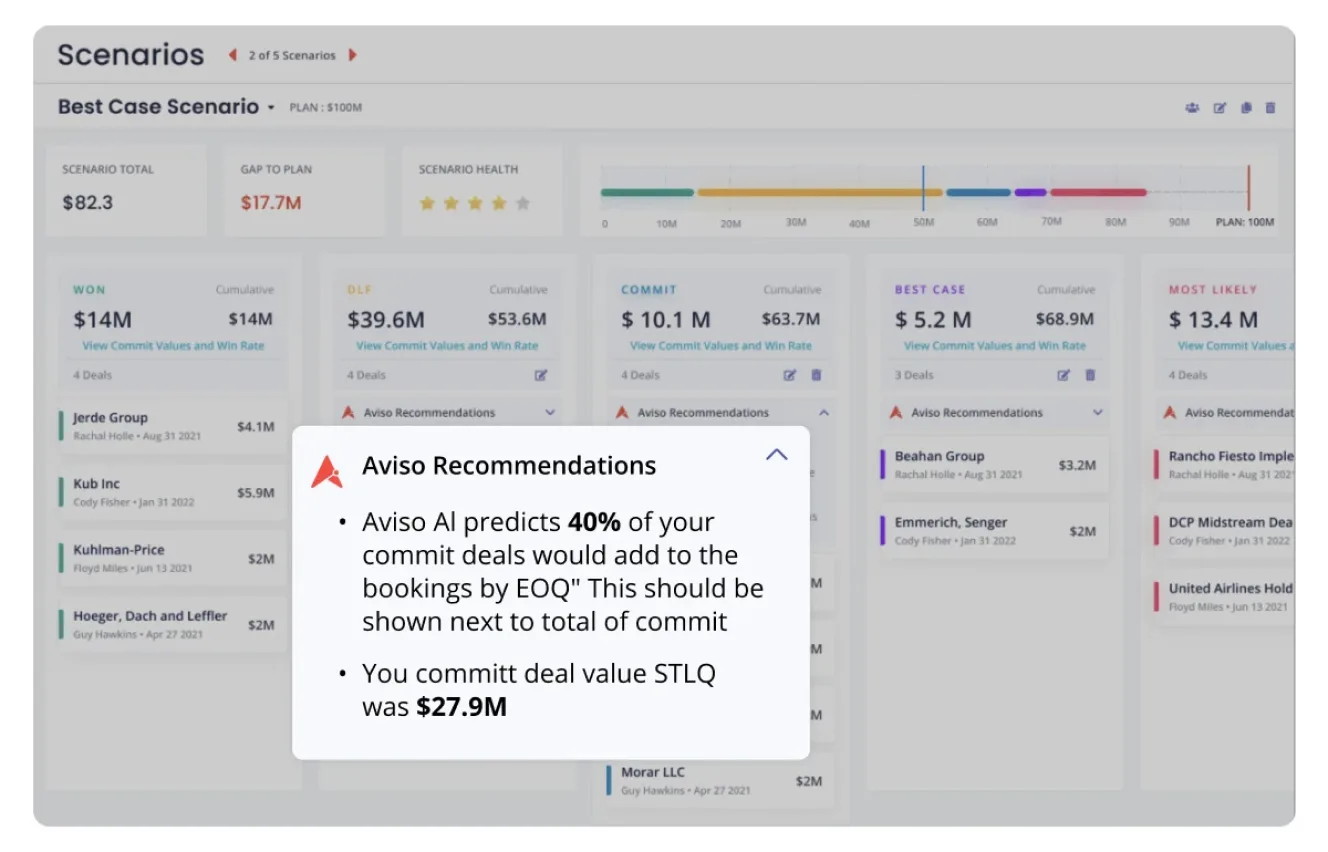
Lead generation
AI can automate lead generation, handling everything from data entry to lead scoring to segmentation to email outreach. By analyzing data signals like demographics, behavior, and even conversation sentiment, AI lead generation tools can identify and nurture high-potential prospects in real time. All told, AI results in teams spending less time chasing dead ends, faster follow-ups, and a more qualified pipeline.
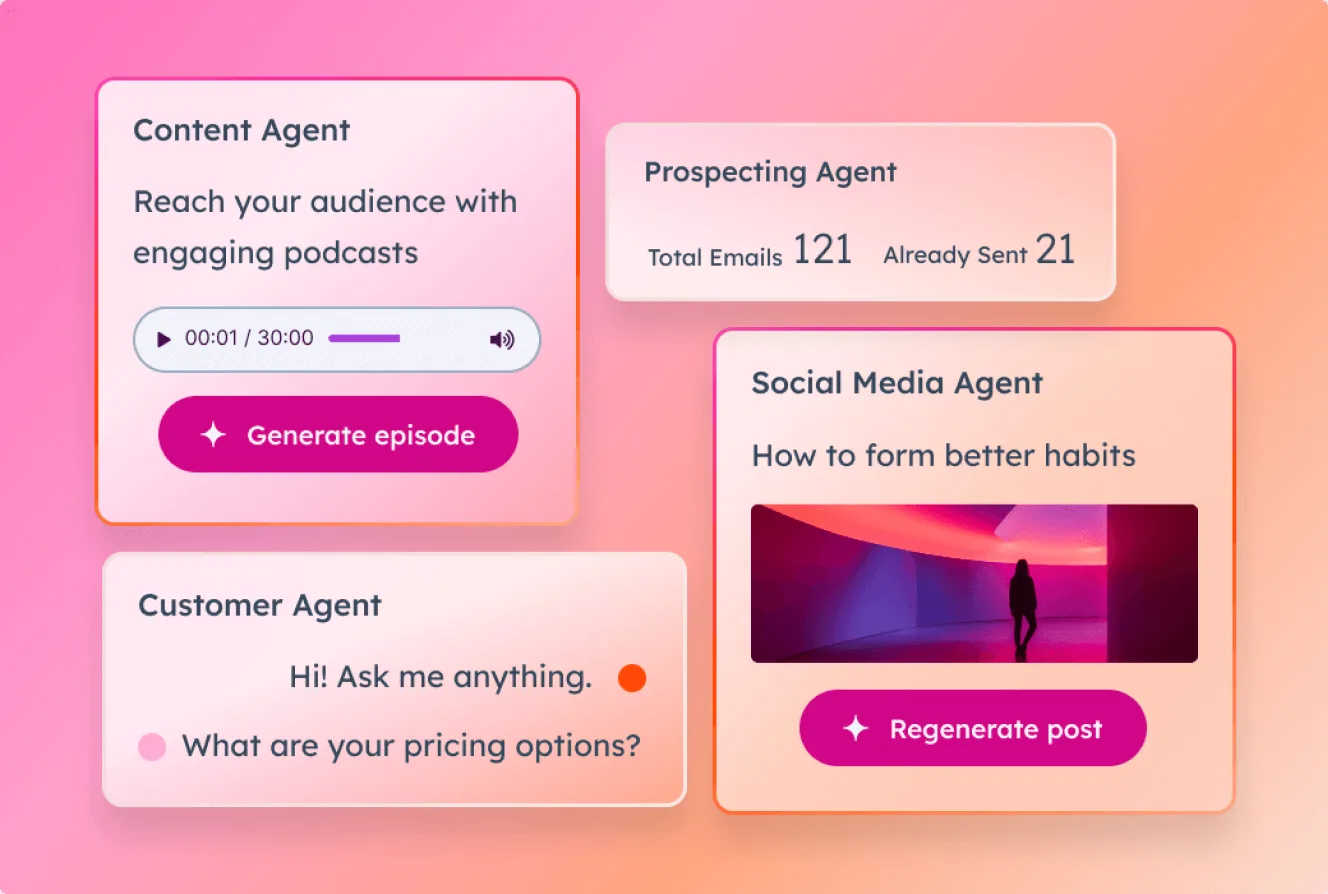
Sales automation
AI tools can handle various tasks traditionally performed by humans—lead qualification, sales forecasting, cold outreach, and more—only in less time, with greater accuracy, and at a fraction of the cost.
According to Accenture, companies using AI automation have seen revenue growth of up to 50% compared to their peers. By freeing up resources, sales teams can concentrate on activities that truly impact growth, saving their time and skillset for focusing on closing deals.
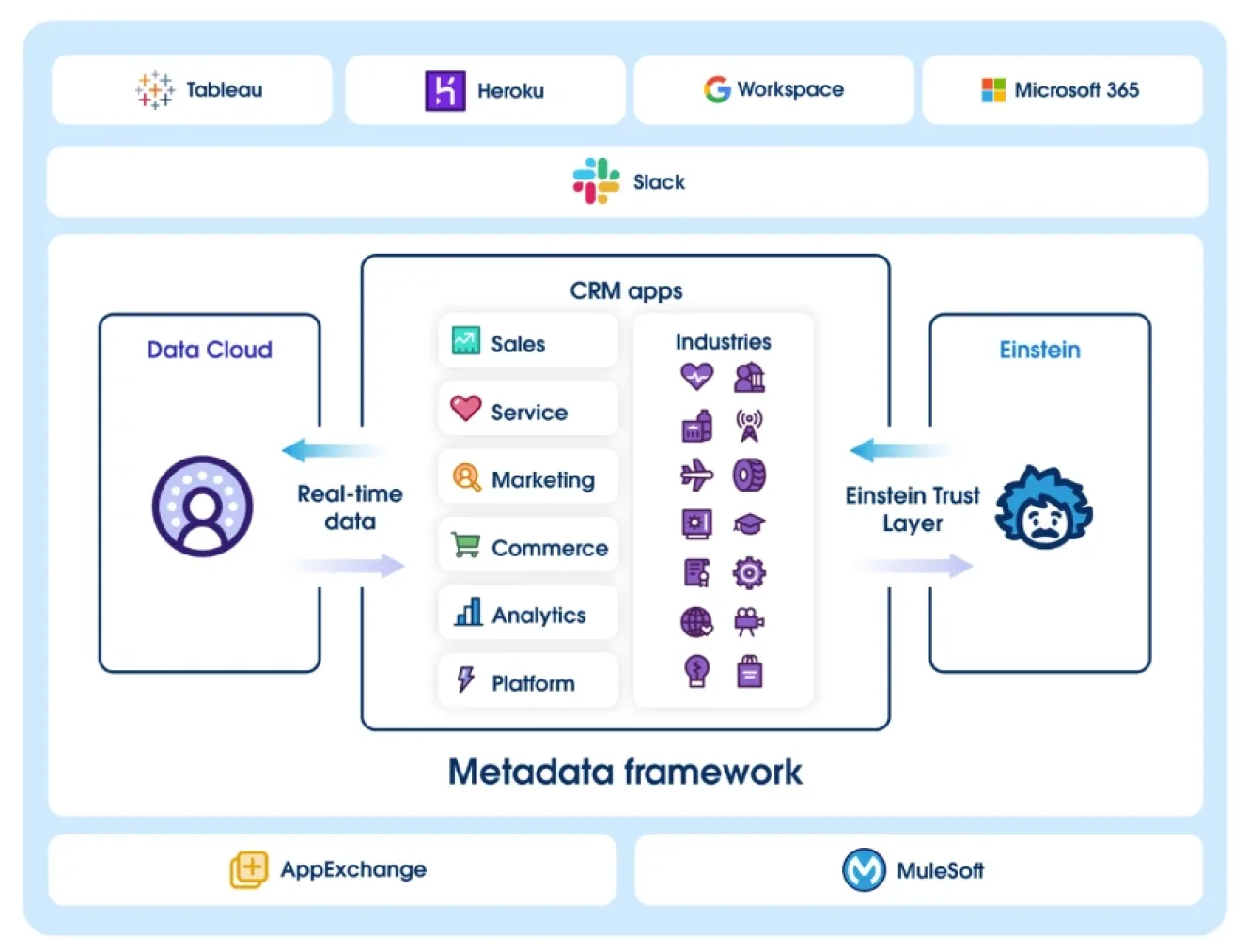
Personalization
AI brings a new level of precision to sales personalization. For instance, teams can use GenAI tools to auto-adjust email content, product recommendations, or talking points based on each prospect’s unique profile, which has led to a 25% lift in email click-through rates for some companies.
AI agents take this a step further. By continuously analyzing historical data and real-time customer behavior, like clicking a link, agents can deliver the most contextually appropriate outreach to each customer at scale—effectively adjusting each customer journey on the fly based on the latest intent signals. By turning insights into scalable, hyper-targeted outreach, agents help sales teams to increase engagement, cut through the noise, and set more meetings.
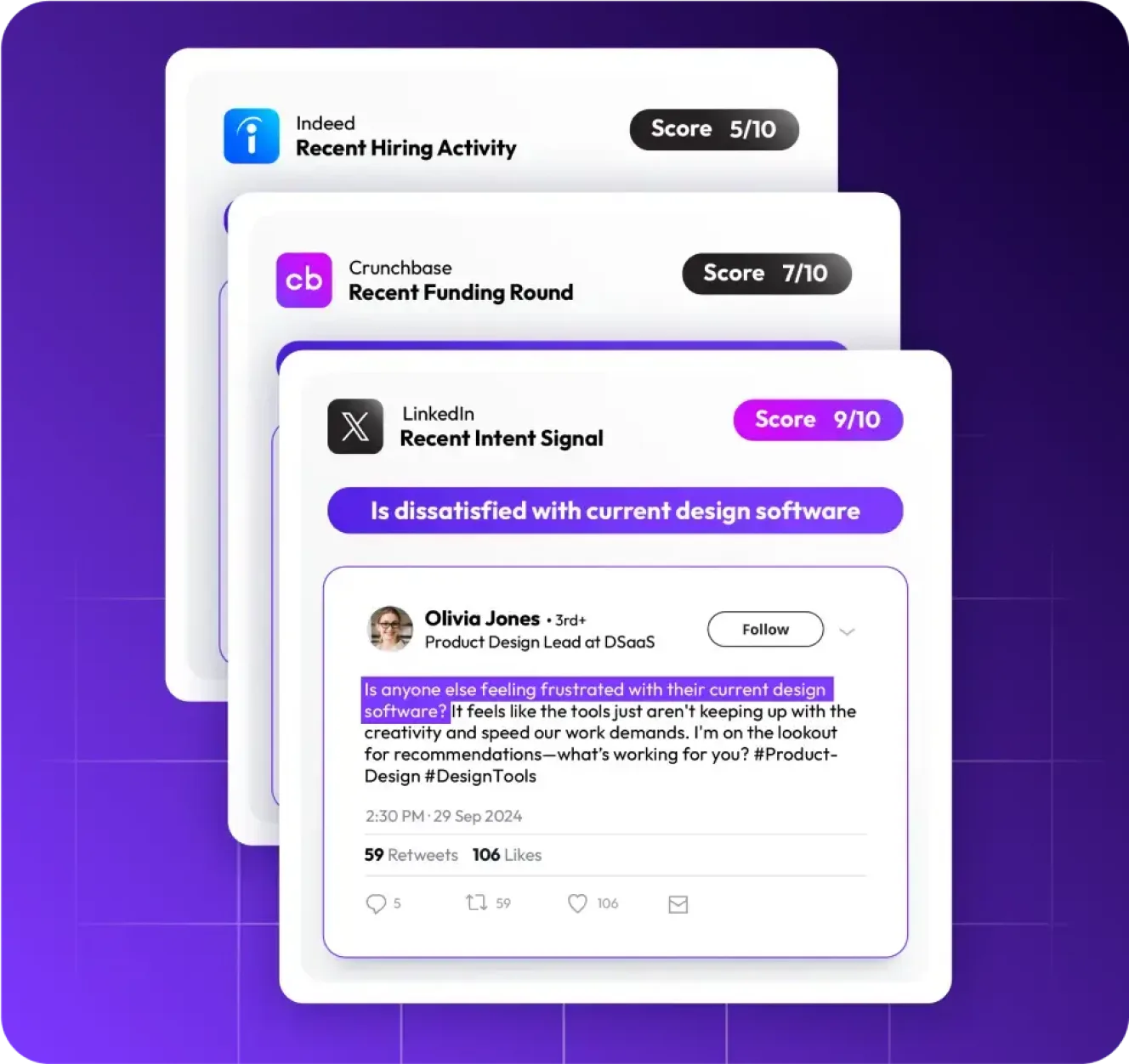
Sales enablement
AI is becoming a critical part of sales enablement, powering everything from lead prioritization and personalized outreach to real-time coaching and workflow automation. Rather than replacing sellers, AI enhances their performance and efficiency, whether by delivering the right insight at a key moment or handling mundane tasks. When embedded into everyday workflows, AI not only helps to drive productivity but also improves the buyer experience and win rates.
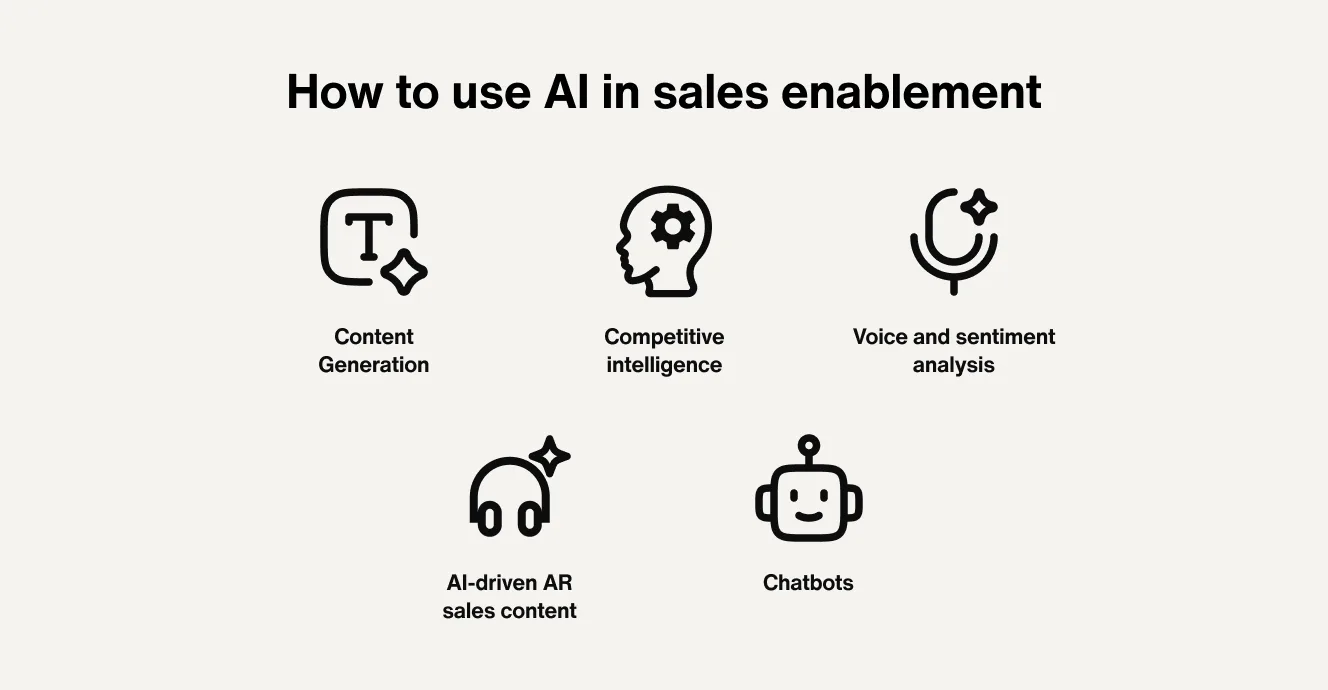
Sales training
AI is reshaping how teams onboard, coach, and upskill reps. AI-driven sales platforms and tools can analyze sales calls and emails to identify strengths, weaknesses, and areas for improvement, offering feedback that helps reps refine their messaging, tone, talk rate, and objection handling.
By continuously learning from top-performing reps and customer interactions, AI helps to ensure training is aligned with real-world selling conditions and best practices. This way, teams can continuously improve performance and lose fewer deals due to poor discovery or business acumen.
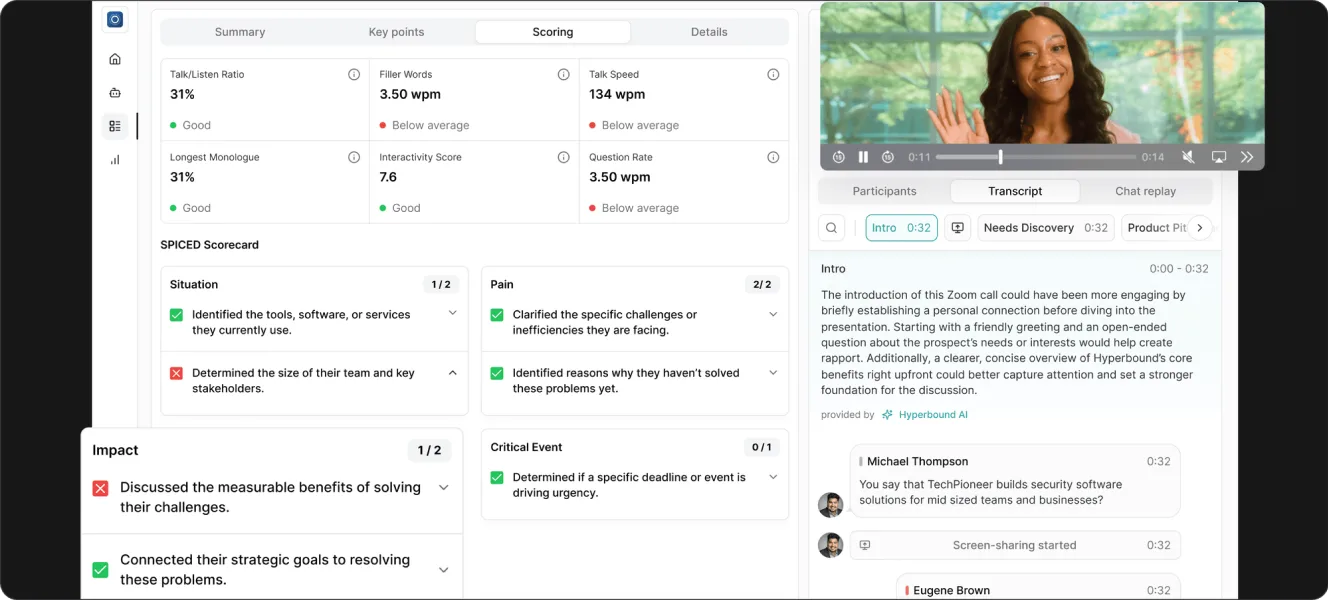
Analytics and reporting
AI-driven analytics and reporting tools offer more accurate, comprehensive insights into sales activities, customer behavior, and market trends than traditional methods. Whether used to identify trends, bottlenecks, or growth opportunities, AI insights help sales leaders to see what’s working, what needs improvement, and how to optimize strategies with data-driven decisions.
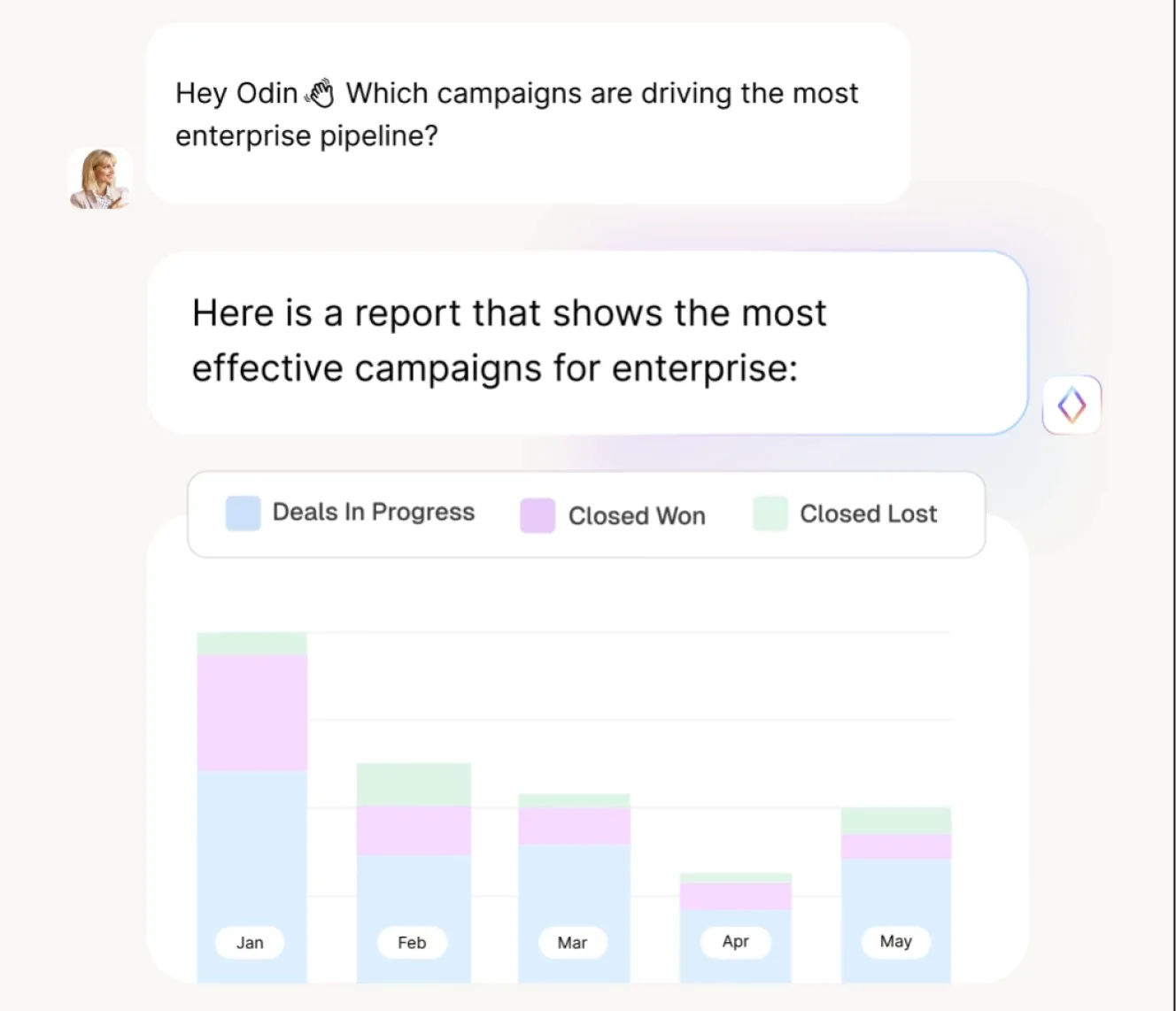

Leverage omnichannel AI for customer support
Benefits of AI in sales
AI offers a significant advantage to sales teams, helping them to improve efficiency, productivity, and sales performance. These benefits include:
Improved productivity: By automating repetitive, mundane tasks, AI frees reps up to focus on building relationships with prospects and closing deals.
Superior insights: AI can identify and apply insights from big data and various real-world sources in real time at scale. This enables teams to make data-driven decisions, enhance personalization, and stay agile as market conditions evolve.
Better customer experience: An increasing number of B2B buyers prioritize the customer experience above price and product. By enhancing personalization, training, and quality of insights, AI for B2B support and sales helps create more resonant and effective sales strategies.
Reduced costs: AI tools help sales teams do more with less, saving on everything from personnel costs to ad spend.
Faster time to market: AI helps teams to quickly create and optimize go-to-market strategies with insights into unmet needs or competitor gaps.
Shorter sales cycle: AI helps sales teams provide customers with the most relevant content across channels right when they want it, helping move prospects through the sales cycle faster.
Competitive advantage: By providing insights, scaling hyper-personalized outreach, and increasing efficiency, AI can translate to a big leg up on competitors.
6 key types of AI in sales (with examples)
AI isn’t a single technology—it’s a suite of powerful tools that can be used together to improve core sales processes. These include:
Machine learning (ML)
Machine learning algorithms allow computers to analyze vast and varied datasets to identify patterns and insights that humans can’t. After learning the data, AI can make predictions and decisions based on it to guide automation, segmentation, lead scoring, and more.
Example: A cybersecurity firm uses ML to analyze thousands of closed-won and closed-lost deals, then recommends which prospects reps should prioritize based on similarity scoring and deal history.
Conversational AI
Just like it sounds, conversational AI uses natural language processing (NLP) to understand and respond to users in human language. For instance, it enables AI agents to answer questions, qualify leads, recommend products, collect data, and even handle cross-sells across websites, social, email, WhatsApp, SMS, and more. Teams can use AI for marketing and sales to scale personalized, real-time conversations across every channel.
Example: Redfin deployed an AI virtual assistant on its mobile app to guide users through digital home viewings with video, audio, and text support—all initiated by natural language prompts from millions of customers at a global scale.
Predictive analytics
Predictive analytics uses historical data, behavioral signals, and real-time insights to forecast buyer intent and sales outcomes. Tapping into first-party data, market trends, and industry signals helps teams make smarter decisions, focus on the right leads, and plan resources ahead of the curve. It’s also a powerful tool for keeping the pipeline healthy, priorities clear, and churn low.
Example: Target uses predictive analytics to identify customers expecting a baby, then sends targeted promotions for their baby-care products to boost sales.
Generative AI
A full 87% of sales leaders are feeling a top-down push to implement generative AI (GenAI) in the wake of ChatGPT’s release in 2022. Used mainly for content creation, GenAI can instantly draft personalized emails, call scripts, and product pitches, all tailored to the prospect’s intent, context, and your brand’s voice (with a final review from a rep, of course).
GenAI also powers virtual assistants (copilots) that surface real-time insights for reps, fueling chat-based interactions that enhance the sales process.
Example: Verizon uses genAI to enhance the sales process, specifically personalization and product recommendations.
Agentic AI
Agentic AI, aka AI agents, is autonomous software that integrates across the sales ecosystem and performs tasks on behalf of other sales systems. They reason, use tools (including APIs), and process real-time data to adjust decision-making and personalization on the fly.
AI customer service brings a new level of adaptability and interoperability to sales automation, poised to redefine customer experience and operational efficiency. According to experts at Columbia Business School and Harvard University:
The future of go-to-market strategies will involve AI agents handling tasks in sequence—identifying ideal prospect profiles, targeting companies, finding contacts, personalizing outreach via email, phone, and text, and managing cadences and delivery. This allows for highly targeted outbound strategies and the automatic generation of personalized messaging.
As a result, the traditional role of sales development representatives (SDRs) is diminishing. AI can now perform many of the tasks previously managed by humans, leading to a leaner and more efficient lead-generation process.
Example: A Portuguese real estate brokerage uses AI agents to generate leads worth $100 million in sales. It guides buyers through listings at any time, chatting with them, showing videos, qualifying with questions, and collecting lead data to advance the sales journey.
Smart process automation
While AI agents tackle complex workflows, smart process automation (SPA) handles basic tasks like lead scoring, data entry, scheduling meetings, and triggering workflows. Powered by ML and NLP, SPA can even process unstructured data from emails or social posts, extending the reach and impact of sales automation across channels in ways traditional methods can’t match.
Example: Platforms like Salesforce use SPA to analyze call transcripts using AI to identify pain points and follow-up opportunities, then trigger outreach to ensure timely, consistent follow-ups.
Pro tip: Integrating multiple AI types can create a synergistic effect that enhances overall performance. For instance, combining predictive analytics to identify high-potential leads with generative AI to craft personalized outreach messages to improve conversion rates and efficiency.

8 major support hassles solved with AI agents
Top AI sales tools for 2025
AI tools for sales are proliferating, catering to every stage of the sales funnel. To help you choose the right AI sales tool for your business, here’s a breakdown of some of the most popular and essential AI sales tools:
AI-driven CRMs
Many CRMs now offer AI-powered features for lead management, sales automation, content creation, and customer analytics.
Salesforce Einstein: Provides AI tools for managing pipelines, identifying leads, and predicting sales outcomes.
HubSpot Sales Hub: Offers AI-powered features for pipeline management, sales reporting, and forecasting.
Sales intelligence
Seamless AI: Provides sales intelligence tools to find and verify prospect contact information.
6sense: Offers insights and real-time intent signals into companies that are actively researching solutions related to a business's offerings.
Lead generation and prospecting
Clay: AI-powered platform that integrates 100+ data sources to enrich and score leads, automate outreach, and personalize messaging.
Crustdata: Offers hosted APIs for real-time LinkedIn data, including LinkedIn Sales Navigator data. A great place to find your prospects and build your lead lists.
BetterContact: An AI-powered waterfall enrichment tool connected to 15+ data sources to find any email.
Sales engagement
Salesforce: AI-powered CRM that provides sales teams with real-time insights, automation tools, and personalized customer experiences.
Regie.ai: All-inclusive tool that uses AI for various sales activities, including prospecting, copywriting, and sequencing.
Generative AI for content creation
Regie.ai: Generates personalized email sequences and multichannel sales messaging.
Conversational AI and chatbots
Salesloft: chatbots designed for AI lead generation and qualification on websites and more.
Synthflow: AI-powered phone system for lead qualification and meeting scheduling.
Call analytics
Gong: A sales intelligence platform that analyzes sales conversations to provide actionable insights for improving sales strategies.
AI agents for sales
Google and others are coming out with standardized frameworks for building AI agents into existing systems and architecture. Non-technical teams can also use AI agent builders such as:
Lindy: Allows non-technical users to build AI agents for outreach workflows.
Delight: Offers omnichannel AI concierges for customer service that can also help generate leads for upsell and cross-sell if instructed to do so.
10 real-world AI in sales examples
Looking for concrete examples of how to use AI in sales with real-world results? This next section offers 10 examples of AI in sales with case studies from leading companies that showcase the versatility and value of using AI.
1. AI-powered competitive analysis
As part of a strategic shift to target small enterprises, SAP used over 40 AI tools to research competitors, map customer journeys, and identify new market segments. AI-driven analysis streamlined and enhanced research efforts, reduced SAP’s 12-18 month sales cycle to 3–6 months, and led to over 22,000 new customer opportunities.
2. AI lead generation
An industrial materials distributor implemented an AI engine to analyze internal and external data sources like construction permits to identify new sales opportunities, leading to a 10% increase in their sales pipeline.
3. Conversational AI for proactive engagement
An enterprise retailer uses conversational AI chatbots to proactively engage website visitors on pricing and product pages. By asking qualifying questions and routing high-intent leads to human representatives, AI chatbots resulted in a 30% increase in Marketing Qualified Lead (MQL) conversions.
4. AI sales intelligence
A leading equipment manufacturer faced challenges with a fragmented customer base and low visibility into installations. By deploying machine learning algorithms to clean sales data and identify opportunities, they increased pipeline by more than 20%.
5. AI SDRs
Companies like Alta offer an AI workforce for sales teams. A team of specialized AI agents (a multi-agent system) performs tasks of SDRs—there’s "Katie" for prospecting or "Luna" for revenue operations—automating research, outreach, meeting scheduling, and more. If orchestrated with AI, they can even collaborate to handle more complex AI workflows.
6. Boosting productivity with virtual assistants
Companies are using AI virtual assistants (copilots) to guide and enhance client interactions. These tools assist in quickly researching clients, providing real-time advice, and simulating negotiation techniques, significantly aiding preparedness in face-to-face meetings.
7. AI lead scoring
U.S. Bank integrated Einstein, Salesforce’s AI for lead scoring and qualification, achieving a 260% increase in lead conversion rates and a 300% rise in marketing-qualified leads (MQLs).
8. Predictive analytics
A healthcare organization uses predictive analytics to streamline its response to Requests for Proposals (RFPs). By analyzing past data, the organization could predict the likelihood of success and tailor their responses accordingly, improving its win rates.
9. AI-generated outreach content
An enterprise manufacturer used genAI to scale its personalized outreach. By analyzing customer data and preferences, the company quickly created a list of content tailored to each client, leading to increased engagement and a 20% boost in their sales pipeline.
10. AI meeting summaries
A global SaaS provider integrated an AI assistant into Zoom meetings to automatically generate transcripts, summarize key points, and flag action items in sales meetings. This automation allowed reps to focus entirely on client conversations and expedite post-call follow-ups.

Leverage omnichannel AI for customer support
What are the challenges of AI in sales?
For all its transformative benefits, AI in sales isn't without a set of concerns and challenges. Here are the key challenges that must be addressed to ensure sustainable and scalable success using AI:
Data privacy and security
AI depends on large amounts of data, and mishandling it can lead to breaches or regulatory issues, especially around data privacy under GDPR and other regulations. This makes strong data governance and AI compliance essential new practices.
Ethical concerns
Analyzing emotions or predicting vulnerabilities can raise ethical red flags. Teams must balance personalization with respect for customer trust and boundaries (especially in ecommerce use cases of AI).
Resistance to adoption
Some reps may fear AI will replace them, leading them to distrust or underuse new AI tools. Training and clear communication help build confidence and encourage adoption.
Data quality and accuracy
Poor data leads to poor AI results. Incomplete or outdated data in CRMs or training sources can skew insights and performance, making good data hygiene practices essential to sustainable success.
Integration
Legacy tools may not play well with AI. Successful adoption often requires system upgrades or platforms built for AI compatibility, like those with native integrations or scalable APIs.
AI in sales best practices
To make the most of AI in sales, consider these best practices:
1. Define your goals and objectives
It begins by defining what you want to accomplish with AI. Whether that’s improving lead quality, shortening the sales cycle, or increasing sales forecast accuracy, laying out your objectives in concrete terms that align with broader KPIs will provide a roadmap and help you measure success.
2. Prioritize data quality and governance
AI tools are only as good as the data they use. Ensure your CRM, sales activity logs, and buyer interaction data are clean, consistent, and complete. Also, strong data governance protocols should be established to maintain data accuracy, comply with privacy regulations (like GDPR), and mitigate AI risks.
3. Choose the right AI tools
Next, it’s time to pick the tools that align with your use cases and tech stack. Often, AI sales tools overlap in their capabilities, so prioritize those with features tailored specifically to your target use cases. Look for tools that offer native integrations with your CRM and other platforms or robust APIs for fast, easy use and scalability.
4. Train your sales team
AI tools will fall short of their full potential if sales teams can’t use them effectively. Be sure to offer tool-specific training, which can cover topics like how to interpret AI insights and how to act on them using new AI-driven workflows. Also, encourage testing and iteration. Be sure to introduce AI as a sales enablement resource that’s shifting how reps work, not replacing it.
5. Keep the human touch
AI is great for top-funnel tasks, but human connection and trust are still what close deals. Encourage reps to focus their time on high-touch conversations, navigating complex buyer journeys, and creating bespoke solutions using AI for B2B support that stand out. For example, reps should always check AI-made content like email before it's used to ensure the messaging meets brand standards and sounds human.
6. Monitor performance and optimize
AI isn’t a technology you can set and forget. Because it relies heavily on its training data, AI is vulnerable to performance issues like hallucinations (inaccurate or made-up outputs), bias, and model drift—when accuracy declines as its training data becomes outdated or misaligned with real-world conditions—all of which can lead to unreliable performance.
To ensure your AI tools deliver the best results, it’s important to monitor performance, test, and optimize them regularly. In addition to tracking core business KPIs, evaluate key AI-specific metrics, including:
Tool performance: Are AI’s outputs accurate, fast, and helpful?
Data quality: Is your data complete, up-to-date, and consistent?
Customer experience: How does AI affect CSAT scores, engagement rates, and meetings booked?
By consistently measuring and optimizing these areas, you can maintain brand standards and ensure your AI systems remain risk-free, compliant, and effective over time.
What is the future of AI in sales?
AI is redefining what it means to be a seller. It’s giving teams better data, smarter tools, and more time to focus on what really moves the needle.
For sales reps, AI is a productivity tool. It offers comprehensive, actionable insights for immediate use while also automating boring work such as prospecting, lead scoring, and setting —saving time so reps can focus on their craft: selling.
For sales leaders, AI is a strategic engine. It provides greater forecasting accuracy, pipeline visibility, and performance insights at a scale and speed that no human team can match—optimizing team performance, driving more consistent revenue, and promoting agility.
Ultimately, with AI adoption increasing, the future of sales belongs to teams that combine human judgment with data-driven precision. Whether you’re calling the shots or calling customers, AI-powered sales offers a competitive edge that no team can afford to ignore.
For customizable AI agents for B2B customer support and sales engagement, Delight can help.
👉 Contact sales to learn more.











